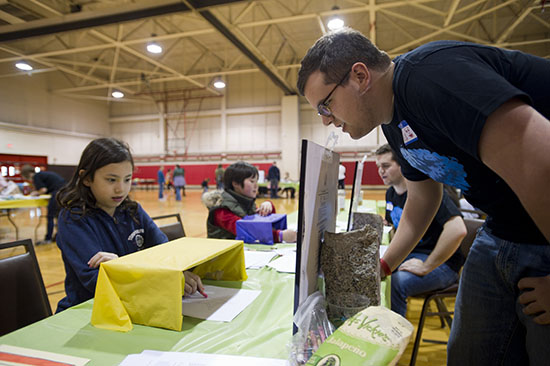Food for Thought
B.R.A.I.N. Day spotlights our growing neuro-knowledge

At last year’s B.R.A.I.N Day, Anan Desimone, 9, of Brookline, tries her hand at mirror drawing, with the encouragement of Alex Barber (CAS’14). BU is sponsoring B.R.A.I.N Day again this Sunday. Photo by Cydney Scott.
At three pounds, your brain is only about 2 percent of your body weight. Yet it makes you you, rather than a chimp or a silkworm. With neuroscience learning more about why and how this organ works, student members of BU’s Mind and Brain Society will run interactive events and videos this Sunday showcasing what one organizer calls “the wonders and mysteries” of the brain.
Bringing Recognition And Interest to Neuroscience (or B.R.A.I.N., as your advanced human brain will tell you) Day is free and open to the University community and area grade school kids, parents, and teachers, but registration is required. The event is sponsored by the Mind and Brain Society, which hosts neuroscience presentations for BU undergraduates, and the University’s Undergraduate Program in Neuroscience (UPN).
This is the University’s second B.R.A.I.N. Day and the first open to the BU community, says UPN program manager Ashley Hoesing. Involving BU students made sense, as other brain-focused events that have been open to University students “are always a hit,” says UPN director Paul Lipton, a College of Arts & Sciences professor of neuroscience, who is also director of the Undergraduate Research Opportunities Program. “These events are an opportunity for our students to be the experts, to share with their peers their disciplinary interests, and to provide exposure to topics and questions to which folks might otherwise never be introduced.”
The event is BU’s way of observing Brain Awareness Week, a worldwide campaign to promote brain research, held this year from March 16 to 22, sponsored by the New York–based Dana Foundation, a private philanthropic organization that supports brain research through grants, publications, and educational programs.
The brain’s operation “happens seamlessly and effortlessly,” Hoesing says, “and we often take for granted the fruits of our brain’s labor.” While we know a lot about how this operation works, she says, “we don’t know what happens in the brain to produce our unique subjective experience of the internal and external world.”
Last year’s event drew about 100 grade school students. This year’s participants will be able to record neuron activity, perform tests of such brain functions as attention, memory, and language ability, and operate robots—without using hands—among many other activities.
“The goal is to teach folks a little about how the brain processes information and leave them with an impression of the brain’s complexity,” Hoesing says. “The activities are designed to demonstrate some of the different ways we engage with the external world—that is, our senses. Our brains rely on our sense organs to translate signals from the external world into a language our brains can understand.”
“We are exited to teach kids more about neuroscience,” B.R.A.I.N. Day volunteer Annalyse Kohley (CAS’17) says, “and I hope the volunteers find this rewarding, as well as learn more about neuroscience through the preparation.”
B.R.A.I.N. Day runs from 11 a.m. to 2 p.m. this Sunday, March 22, in the George Sherman Union Ziskind Lounge, second floor, 775 Commonwealth Ave. It is free and open to the University community and area grade school students, parents, and teachers; register here.
Comments & Discussion
Boston University moderates comments to facilitate an informed, substantive, civil conversation. Abusive, profane, self-promotional, misleading, incoherent or off-topic comments will be rejected. Moderators are staffed during regular business hours (EST) and can only accept comments written in English. Statistics or facts must include a citation or a link to the citation.